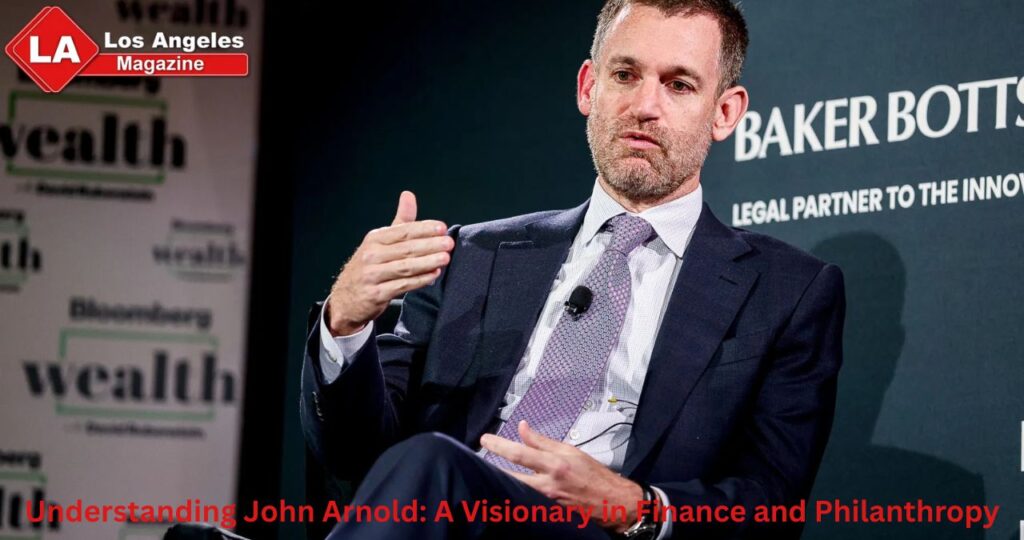John Arnold is a former hedge fund manager and philanthropist known for his success in the energy trading industry and his transformative approach to philanthropy. Born in 1974, Arnold demonstrated an early aptitude for finance and analytics, eventually leading him to a distinguished career in the energy sector.
After graduating from Vanderbilt University with a degree in mathematics and economics, Arnold joined Enron as a trader. His ability to navigate complex energy markets quickly set him apart. Even in the turbulent environment of Enron’s final years, he achieved remarkable success, earning the company substantial profits. Before Enron’s collapse in 2001, Arnold received a significant bonus, which he later used to establish his hedge fund.
In 2002, he founded Centaurus Advisors, a Houston-based hedge fund specializing in energy trading. With a keen understanding of market fluctuations and advanced quantitative strategies, Arnold quickly gained a reputation as one of the most skilled energy traders of his time. His fund saw tremendous growth, outperforming many competitors in the industry. However, in 2012, at the peak of his success, Arnold shocked the financial world by announcing his retirement from trading at just 38 years old. His decision to leave finance was driven by a desire to focus entirely on philanthropy and public policy initiatives.
The Transition to Philanthropy and Public Policy
After stepping away from the financial industry, Arnold and his wife, Laura Arnold, shifted their focus to philanthropy. Together, they established Arnold Ventures, an organization dedicated to tackling some of society’s most pressing issues through evidence-based policy reform.
Unlike traditional philanthropists who focus primarily on charitable giving, Arnold takes a data-driven approach to social change. He believes in funding rigorous research and using empirical evidence to drive policy improvements. This philosophy has positioned Arnold Ventures as a leader in strategic philanthropy, influencing significant policy reforms across multiple sectors.
Key Areas of Focus in Philanthropy
Arnold Ventures targets systemic issues that require long-term solutions rather than temporary relief. The organization’s main focus areas include:
- Criminal Justice Reform – Advocating for fair sentencing policies, reducing mass incarceration, and improving public safety through data-driven interventions.
- Health Care Policy – Addressing rising health care costs, advocating for drug pricing transparency, and improving health system efficiency.
- Public Finance and Tax Policy – Promoting responsible government spending, pension reform, and fiscal sustainability.
- Education Reform – Supporting higher education policies that improve student outcomes and reduce financial burdens on college graduates.
- Research Integrity and Scientific Transparency – Ensuring that policy decisions are based on credible and unbiased research.
Arnold Ventures operates as a hybrid philanthropic model, consisting of a foundation, an advocacy arm, and a limited liability company. This structure allows it to engage in direct policy reform, lobbying efforts, and nonprofit funding without the constraints of traditional foundations.
John Arnold: A Different Approach to Giving
Unlike many philanthropists who focus on immediate aid or high-profile charitable donations, John Arnold is committed to systemic change. His philosophy centers around addressing root causes rather than symptoms, ensuring that philanthropic investments lead to measurable and lasting impact.
For example, in the area of drug pricing reform, Arnold Ventures has funded extensive research on how pharmaceutical pricing structures contribute to rising healthcare costs. Rather than simply donating to health organizations, Arnold’s team works with policymakers to advocate for legislation that increases transparency and reduces financial burdens on consumers.
Similarly, in criminal justice reform, Arnold has backed initiatives aimed at improving pretrial policies, eliminating cash bail for nonviolent offenders, and reducing recidivism rates through evidence-based rehabilitation programs. By using data and empirical evidence, he ensures that resources are allocated to initiatives that yield measurable improvements in societal outcomes.
Challenges and Criticisms
Despite the positive impact of his philanthropic efforts, Arnold’s approach has not been without controversy. Some critics argue that his policy-driven giving allows private wealth to exert too much influence over public institutions. His involvement in pension reform, in particular, has drawn opposition from unions and public sector employees who fear that restructuring government pension plans could lead to reduced benefits.
Additionally, some political groups have questioned the role of private foundations in shaping legislative priorities. While Arnold Ventures maintains a commitment to transparency and accountability, its active engagement in lobbying efforts has sparked debate over the ethical boundaries of philanthropic influence.
However, Arnold remains steadfast in his belief that philanthropy should be results-oriented. He argues that focusing on evidence-based solutions, rather than ideological debates, is the most effective way to drive meaningful change.
The Lasting Legacy of John Arnold
John Arnold’s impact extends beyond finance and philanthropy—his work has redefined the role of strategic giving in shaping public policy. By prioritizing data-driven solutions and measurable outcomes, he has introduced a new model for how private wealth can be used to address systemic issues.
His ability to transition from a highly successful career in energy trading to one of the most influential philanthropic figures of his generation demonstrates his adaptability and commitment to social progress. Through Arnold Ventures, he continues to challenge conventional philanthropy by emphasizing accountability, research, and policy innovation.
Looking ahead, Arnold’s influence in philanthropy is expected to grow as he expands his work into new areas, including artificial intelligence policy, economic mobility, and climate change mitigation. His legacy will be defined not only by his success in financial markets but also by his ability to apply the same analytical mindset to solving some of society’s most complex challenges.
Conclusion: A Visionary in Finance and Social Reform
John Arnold’s career trajectory is a rare blend of financial acumen and civic responsibility. His transition from hedge fund titan to policy-driven philanthropist highlights his commitment to making a lasting impact on society.
By challenging traditional approaches to giving and focusing on systemic reform, Arnold has positioned himself as a leader in modern philanthropy. His work through Arnold Ventures continues to influence critical policy decisions, proving that data-driven philanthropy can be a powerful force for positive change.
As his initiatives expand, John Arnold remains a model of how strategic philanthropy can bridge the gap between research, policy, and action, ensuring that resources are directed toward solutions that truly make a difference.



